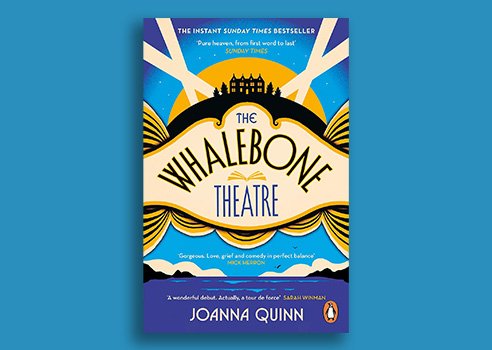Reading time: About 2 minutes
I like to share interesting pieces of figurative language I encounter in my reading. I write today about a series of telling images from Joanna Quinn…
The English writer Joanna Quinn is marvellously imaginative. Although The Whalebone Theatre is her first novel, she writes with the assurance of a much more experienced author.
The story begins in the mid-1920s, when a young girl, whose mother died during her childbirth, is awaiting the arrival of a step-mother. Later, a whale washes up on the shores of the English Channel and the girl and her siblings build a theatre from the beast’s skeletal rib cage. In an incredible flight of imagination, the story carries on until the Second World War when the girl, now a young woman, and her brother, both become secret agents.
It sounds improbable, I know, but I found the story to be delightful. I also appreciated Quinn’s generous and superb use of figurative language. Here are my favourite examples:
- And here she is. She has made it through. . . Despite the view from the rattling carriage windows jerking backwards and forwards like scenery waved about by amateurish stagehands
- She is fixed in place. An exhibit. White-capped maids come and go, lighting the fire and drawing the curtains, as busy and remote as gulls.
- His wooing of her had largely consisted of him presenting her with historical facts in the way a cat continually brings its owner dead mice, despite their perplexing lack of success.
- Willoughby eats like a flamboyant painter — sweeping swathes of marmalade across crumbling toast, pouring milk into his teacup for a jug held so high the liquid becomes a single thin torrent …
- Jasper blows his nose again, a mournful bugle call.
- Every morning she woke exhausted, with a sour metallic taste in her mouth, as if she has spent the night sucking coins.
- After a night of thunderstorms, the air is a fresh as clean laundry.
- The hedgerows take up motion, cow parsley quivering delightedly every time Willoughby roars past in his Daimler; Chilcombe’s horse chestnut trees gladly wave their ice-cream cone flowers, and the buttercup meadows are all swaying invitation.
- Rosalind smiles automatically. She often receives praise from women on behalf of her husband, like diplomatic gifts.
- A few rooks are pecking a the grass, but they take off as Willoughby approaches, with brisk wingbeats of air, an efficient sound like the brushing down of an expensive suit.
- The crisp displays of October, all its smart oranges and yellows, have been spoiled and scatter about as November rushes in, dragging winter behind it like a trail of rattling cans.
- When she gets into bed at night, sleep hits her like a punch.
- The sound of it [rain] hitting the sea is a crackly hiss, like spitting oil in a frying pan.


